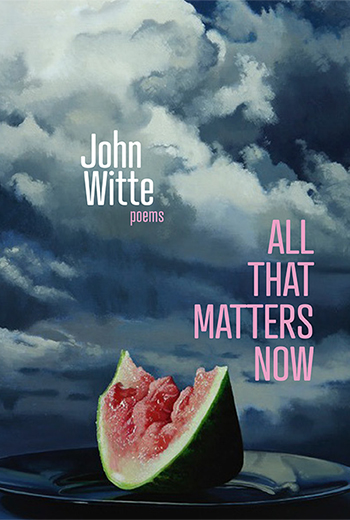
NOTEBOOK
POOL
OH WELL
MANATEE
A HAIR
John Witte is our Blake, the Blake of Songs of Innocence and of Experience. His system is specific and mysterious, personal and vast. Following the grave Disquiet come these psalms on matter: a parent’s body disengaging from its brain, an old man at a play who has to get past the stage to the bathroom, lost bees, geese flying, a manatee who looms behind the observatory glass—a kind of angel—and takes our breath away. Each poem hangs on a wall of its own, like a lit-up X-ray box, with the secrets in it somehow in motion. There are mobsters here, a tornado, a catalogue of clouds, a Kafka so real we pity him, chewing his food. Witte’s stilled watching of these things, and the loaded, mesmerizing, unpunctuated line he has made his own are like nothing else in our poetry. – Valerie Trueblood, author of Search Party: Stories of Rescue
The unpunctuated couplets of John Witte’s All That Matters Now form an unending, exquisite anti-narrative composed of stunning images, which form an undertone of loss, of grief, but also their elusive meaning. In the book’s last masterful and heartbreaking sequence, “Clouds,” Witte asks, “did it happen or was it just/ something you read in a book/ how you briefly gleamed like/ a cloud lit from within” — a question, like all of the other questions in these poems, which goes unanswered, unless everything that precedes it answers, as I believe it wonderfully does, that if there are no endings, there are also no boundaries to our shared consciousness. – Maxine Scates, author of My Wilderness
Tomas Tranströmer believed that beneath each poem lurks an “invisible poem,” a shadow reality that is metaphysically present yet beyond articulation. Few contemporaries embody this slippery, “invisible” poetic like John Witte. All That Matters Now is unabashedly engaged with the expression of the necessary, and these finely etched poems show us a writer of consequence adding another chapter to a growing spiritual autobiography. A stunning account of life’s beautiful and relentless machinations.
– Michael McGriff, author of Eternal Sentences